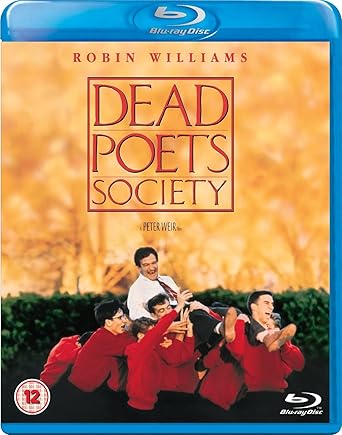
Movie Review: Dead Poets Society (1989)
Dead Poets Society is a powerful drama about inspiration, individuality, and the courage to think differently anchored by Robin Williams’ unforgettable performance.
COMING OF AGEDRAMA

★★★★★
Dead Poets Society hit me hard. It made me want to read more, feel more, and actually live my life. Still one of my favorites.
Jacob C.
Massachusetts
Revisiting Dead Poets Society for BoxReview.com reminded me that it’s more than just an “inspirational teacher” movie. It’s an exploration of what happens when the spark of individuality collides head-on with the rigid walls of tradition.
It’s also a movie that changes depending on when you watch it in life. As a teenager, it feels like a rallying cry. As an adult, it’s a bittersweet reminder of how fragile that youthful idealism can be.
The Premise: Tradition Meets Rebellion
Set in 1959 at the elite Welton Academy, the story follows a group of boys whose orderly lives are disrupted by the arrival of their new English teacher, John Keating (Robin Williams). Keating’s unconventional teaching methods, standing on desks, encouraging poetry recitals outside in the open air, challenge the boys to see the world differently and, most importantly, to “seize the day.”
This awakening leads to the revival of the secret “Dead Poets Society,” where the boys meet in a cave to read poetry, share dreams, and express themselves without judgment. But as their confidence grows, so does the clash with the school’s rigid expectations.
Robin Williams: A Performance of Quiet Brilliance
Much is said about Williams’ humor in this film, but what strikes me more on rewatch is his restraint. He doesn’t dominate the movie; instead, he gives his students room to grow just like a good teacher should.
Williams plays Keating with warmth, wit, and a subtle undercurrent of sadness, as if he knows from experience that the world won’t always reward nonconformity. It’s not just one of his best dramatic roles; it’s one of his most generous performances.
The Boys of Welton: More Than Archetypes
Many reviews focus solely on Ethan Hawke’s shy Todd Anderson and Robert Sean Leonard’s passionate Neil Perry, but the ensemble deserves credit. Each boy represents a different reaction to Keating’s influence, from the eager (Knox Overstreet) to the hesitant (Todd) to the defiant (Charlie Dalton).
These differences matter because they remind us that inspiration isn’t one-size-fits-all. Some will take bold leaps immediately, while others need time or may never take them at all.
Under-Discussed Element: The Role of Environment
Welton Academy itself is a character imposing stone walls, rigid traditions, and a suffocating sense of order. Director Peter Weir uses its architecture and muted color palette to contrast with the freedom of the cave where the boys meet.
Every time we see them in that cave, the lighting is warmer, the air feels looser. It’s a simple but powerful visual cue: the boys’ secret world is alive, while the school’s world is stagnant.
The Tragedy of Neil Perry: A Commentary on Parental Pressure
Neil’s storyline is often remembered for its heartbreaking conclusion, but what’s worth noting is how it’s built up. His father (Kurtwood Smith) isn’t cartoonishly evil; he’s rigid, yes, but his actions come from his own limited worldview. That makes it even sadder.
The tragedy of Neil isn’t just his fate; it’s how preventable it was if only someone had listened. It’s a subtle commentary on how often parents and institutions prioritize achievement over happiness.
Cinematography and Music: Emotion in Every Frame
John Seale’s cinematography captures the New England setting in a way that’s both beautiful and isolating. The natural landscapes contrast with the strict geometry of the school’s interiors.
Maurice Jarre’s score is understated but powerful. The music doesn’t overwhelm the emotions; it supports them, allowing moments like the final “O Captain! My Captain!” scene to feel both grand and intimate.
Why Dead Poets Society Still Resonates
In an era where standardized tests and rigid curricula still dominate, Dead Poets Society feels as relevant as ever. It’s not just about teaching poetry; it’s about teaching students to think for themselves, to value their own voices.
It’s also a reminder that change is rarely welcomed by those in power. Keating’s influence is transformative, but it comes at a cost; not everyone will survive that transformation unscathed.
A Personal Take: Watching as an Adult
When I first saw this as a teenager, I latched onto the rebellious energy. Watching now, I’m struck by the fragility of that moment in life when you feel like anything is possible and how quickly it can be crushed.
There’s an unspoken message here: inspiration is just the beginning. You have to protect it, nurture it, and sometimes fight for it.
Final Thoughts
Dead Poets Society is often remembered for its quotes, “Carpe diem,” “O Captain! My Captain!”, but its real legacy is the way it makes you reflect on your own life. Who were your Keatings? Did you seize the day, or let it pass by?
It’s a film that lingers not just in your memory, but in your outlook on life.
Box Review
Stay connected and follow us on social media for the latest reviews, movie highlights, and behind-the-scenes content.
© 2025-2030. All rights reserved.
Privacy & Legal
Join Our Newsletter!
RSS Feed
Built with ❤️ by CupidName.com

